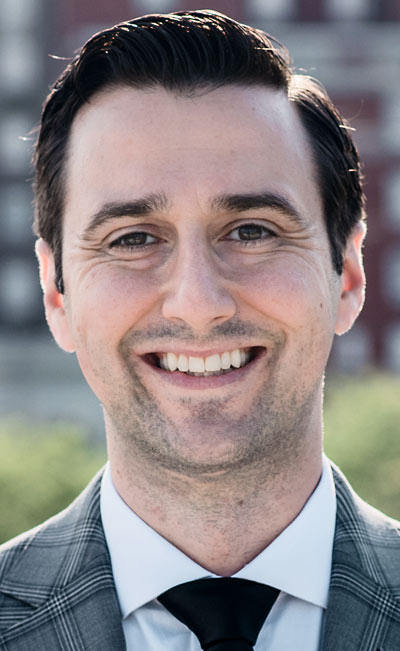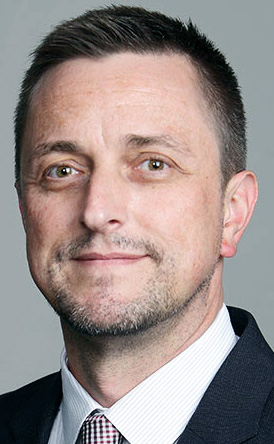

 Dear colleagues and friends, it is very, very difficult to write these words. The loss of a young person is always a tragedy. The untimely loss of a friend is even worse and is always a very difficult time. The loss of a fellow Internet pioneer is like losing a brother. Tarek Kamel was a great friend of the Internet Society–Bulgaria. I remember him giving an interview for the Bulgarian public television in Yokohama during the INET 2000 meeting...
Dear colleagues and friends, it is very, very difficult to write these words. The loss of a young person is always a tragedy. The untimely loss of a friend is even worse and is always a very difficult time. The loss of a fellow Internet pioneer is like losing a brother. Tarek Kamel was a great friend of the Internet Society–Bulgaria. I remember him giving an interview for the Bulgarian public television in Yokohama during the INET 2000 meeting...
 There's a well-documented crisis facing the domain name system: very few who rely on domain name registration data from the Whois database to perform vital functions can do so any longer, which is escalating consumer harm and abuse on the internet worldwide. And the problems, thanks to ICANN's overly restrictive policy post-GDPR and a failing policy process, are piling up.
There's a well-documented crisis facing the domain name system: very few who rely on domain name registration data from the Whois database to perform vital functions can do so any longer, which is escalating consumer harm and abuse on the internet worldwide. And the problems, thanks to ICANN's overly restrictive policy post-GDPR and a failing policy process, are piling up.
 The ICANN Security and Stability Advisory Committee (SSAC) and the Internet Society Deploy360 Programme are planning a DNSSEC and Security Workshop on Wednesday, 06 November 2019, during the ICANN66 meeting held from 02-07 November 2019 in Montreal, Canada. The original DNSSEC Workshop has been a part of ICANN meetings for many years and has provided a forum for both experienced and new people to meet, present and discuss current and future DNSSEC deployments.
The ICANN Security and Stability Advisory Committee (SSAC) and the Internet Society Deploy360 Programme are planning a DNSSEC and Security Workshop on Wednesday, 06 November 2019, during the ICANN66 meeting held from 02-07 November 2019 in Montreal, Canada. The original DNSSEC Workshop has been a part of ICANN meetings for many years and has provided a forum for both experienced and new people to meet, present and discuss current and future DNSSEC deployments.
 Almost every institution which purports to provide space for public accountability includes some sort of formalized process by which the public can have their say. And in almost every instance, they struggle with a tension between the desire to provide a commenting process which is meaningful and substantive (or, at least, which appears to be so), and a desire to adopt whatever course of action the institution thinks is best.
Almost every institution which purports to provide space for public accountability includes some sort of formalized process by which the public can have their say. And in almost every instance, they struggle with a tension between the desire to provide a commenting process which is meaningful and substantive (or, at least, which appears to be so), and a desire to adopt whatever course of action the institution thinks is best.
 ??Dynamics at the Internet's core erode stakeholder legitimacy and aid Sino-Russian efforts for multilateral control. ???At the beginning of what became a prolonged process for privatization, the U.S. Government established a framework of fundamental guiding principles for governance of the Internet's root. These principles were designed to work to preserve a free and open nature for a global network that was to be elastic, extensible, and – at more than two decades – enduring.
??Dynamics at the Internet's core erode stakeholder legitimacy and aid Sino-Russian efforts for multilateral control. ???At the beginning of what became a prolonged process for privatization, the U.S. Government established a framework of fundamental guiding principles for governance of the Internet's root. These principles were designed to work to preserve a free and open nature for a global network that was to be elastic, extensible, and – at more than two decades – enduring.
 Wikipedia defines a Mexican standoff as "a confrontation in which no strategy exists that allows any party to achieve victory. As a result, all participants need to maintain the strategic tension, which remains unresolved until some outside event makes it possible to resolve it." This would be an apt way to describe what may be possibly occurring presently between the Internet Corporation for Assigned Names and Numbers (ICANN) and its largest ratepayer, VeriSign.
Wikipedia defines a Mexican standoff as "a confrontation in which no strategy exists that allows any party to achieve victory. As a result, all participants need to maintain the strategic tension, which remains unresolved until some outside event makes it possible to resolve it." This would be an apt way to describe what may be possibly occurring presently between the Internet Corporation for Assigned Names and Numbers (ICANN) and its largest ratepayer, VeriSign.
 For many industry participants, the timing around opening the next round of new Top-Level Domain applications has been frustrating, to say the least. However, with the recent ICANN Marrakech meeting now complete, we thought it timely to provide an update for those who may be interested to apply in the next round or for those merely following the journey.
For many industry participants, the timing around opening the next round of new Top-Level Domain applications has been frustrating, to say the least. However, with the recent ICANN Marrakech meeting now complete, we thought it timely to provide an update for those who may be interested to apply in the next round or for those merely following the journey.
 It wasn't that long ago that, during a visit home, my brother asked me, "Why are you so stuck on this Internet thing?" His direct question caused me to realize that I had never actually stopped and considered why I was investing so much time – and in such a highly visible manner – into Internet governance when I wasn't being compensated for doing so and, in fact, was – not putting too fine of a point on it – flat broke.
It wasn't that long ago that, during a visit home, my brother asked me, "Why are you so stuck on this Internet thing?" His direct question caused me to realize that I had never actually stopped and considered why I was investing so much time – and in such a highly visible manner – into Internet governance when I wasn't being compensated for doing so and, in fact, was – not putting too fine of a point on it – flat broke.
 This past Monday, as ICANN65 was beginning in Marrakesh, the technical review blog Review Signal published a detailed expose, "The Case for Regulatory Capture of ICANN" authored by site founder and "geek-in-charge" Kevin Ohashi. The post was clearly the product of extensive investigative reporting – and what it reveals is deeply disturbing.
This past Monday, as ICANN65 was beginning in Marrakesh, the technical review blog Review Signal published a detailed expose, "The Case for Regulatory Capture of ICANN" authored by site founder and "geek-in-charge" Kevin Ohashi. The post was clearly the product of extensive investigative reporting – and what it reveals is deeply disturbing.
 For those of us in the domain name industry, it's clear that security threats and the way we track, report, and mitigate them has been a topic of increased discussion and focus in recent months. As we prepare to come together as a community again at the next ICANN public meeting in Marrakech, many of us will look to continue these conversations, as there is no doubt it is a topic of importance, relevance and urgency for our community at this time.
For those of us in the domain name industry, it's clear that security threats and the way we track, report, and mitigate them has been a topic of increased discussion and focus in recent months. As we prepare to come together as a community again at the next ICANN public meeting in Marrakech, many of us will look to continue these conversations, as there is no doubt it is a topic of importance, relevance and urgency for our community at this time.